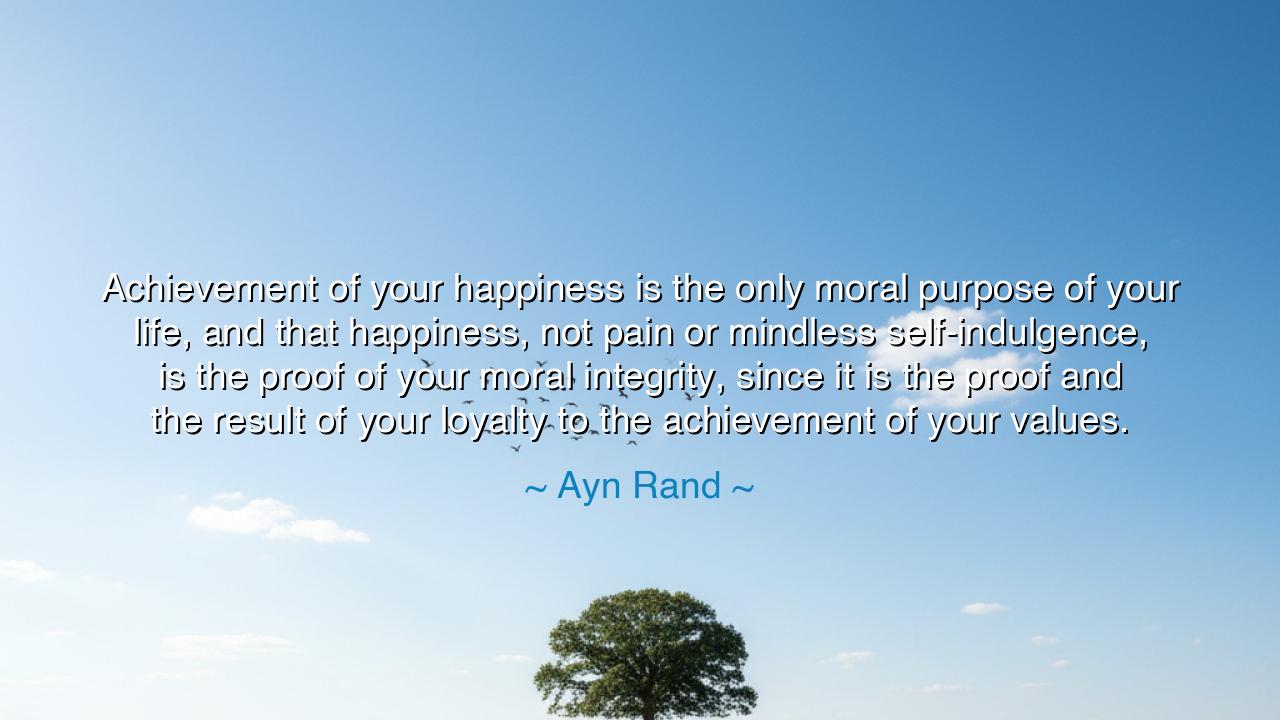
Achievement of your happiness is the only moral purpose of your
Achievement of your happiness is the only moral purpose of your life, and that happiness, not pain or mindless self-indulgence, is the proof of your moral integrity, since it is the proof and the result of your loyalty to the achievement of your values.






The philosopher and novelist Ayn Rand, fire-hearted and unyielding, once declared: “Achievement of your happiness is the only moral purpose of your life, and that happiness, not pain or mindless self-indulgence, is the proof of your moral integrity, since it is the proof and the result of your loyalty to the achievement of your values.” In this bold pronouncement, she calls each human being to live as a creator and a moral architect of their own soul. Her words, like a blazing torch, illuminate the path of individual purpose, moral integrity, and rational joy—a path not of submission or guilt, but of triumph through reason, effort, and virtue.
To understand these words, one must first know the spirit of Ayn Rand herself. Born in Russia in the early 20th century, she witnessed a society that crushed the individual beneath the weight of collectivism. She saw dreams silenced, talent punished, and ambition scorned. From this crucible of oppression, she forged a philosophy she called Objectivism—a celebration of reason, independence, and the moral worth of pursuing one’s own happiness. To Rand, happiness was not a fleeting pleasure or a selfish whim, but the radiant reward of living truthfully, of aligning one’s life with one’s highest values and goals.
When she speaks of the “achievement of your happiness,” she does not speak of comfort or ease. She speaks of the noble joy that arises from creation, mastery, and purpose. True happiness, in her view, is not given—it is earned. It is the moral consequence of a life lived with clarity and courage, guided by reason rather than by guilt or submission. To her, a man who achieves happiness through the honest pursuit of his values is a moral man, for he has neither stolen nor begged for his joy—he has built it with his own hands, his own mind, and his own integrity.
Rand warns, however, against two false paths: pain and mindless self-indulgence. Pain, she says, is not a virtue to be worshipped; suffering is not a badge of honor. To live for misery is to betray the purpose of life itself. Yet neither is reckless pleasure, the pursuit of momentary thrills or unthinking greed, a mark of morality. For mindless self-indulgence is a kind of decay—a corruption of purpose that mistakes excess for fulfillment. The happiness Rand celebrates is rational and earned—it is the deep, sustaining peace that comes when one’s mind, actions, and values are in harmony.
We see this truth mirrored in the lives of the great creators and builders of history. Consider Thomas Edison, who through tireless effort brought light to the world. His happiness was not in the ease of leisure, but in the achievement of creation—the triumph of mind over darkness. Or Marie Curie, who pursued the mysteries of science not for fame or comfort, but for the joy of discovery and the pursuit of truth. Their joy was not indulgence; it was integrity. Their happiness was proof of their loyalty to their values, the fruit of their devotion to purpose. Such lives remind us that morality and joy are not enemies, but allies—that to live rightly is to live fully, and to live fully is to live joyously.
Thus, Rand’s message is not one of selfishness, as her critics often claim, but of self-responsibility. She teaches that to betray one’s mind, to live by falsehood or fear, is the deepest immorality. But to honor one’s reason, to strive for excellence, to build and love and create in the image of one’s own highest ideals—that is the sacred duty of man. Happiness, she tells us, is not the purpose of others, nor a gift to be granted—it is the just reward for those who live with virtue and courage.
To live by this wisdom is to take up the lifelong work of aligning your heart with your values. Ask yourself, each day: What do I love? What do I create? Do my actions reflect my ideals, or do I betray them in fear or compromise? Pursue not comfort, but clarity. Build your life as an artist builds a sculpture—deliberately, with effort, with vision. Let your happiness be your compass and your proof, the living sign that you have been faithful to your truth.
So, my children, hear this teaching of Ayn Rand: that happiness is not the enemy of morality, but its reward. It is not indulgence, but integrity. It is not escape, but achievement. Live as though your life is a sacred creation, for it is. Let your joy be the light that testifies to your courage, your reason, and your honor. For the one who lives by his values does not need to seek happiness—it blooms naturally, like sunlight from within. And when you achieve it, know this: you have fulfilled the highest moral purpose of life—to live, to love, and to rejoice in the glory of your own being.






AAdministratorAdministrator
Welcome, honored guests. Please leave a comment, we will respond soon